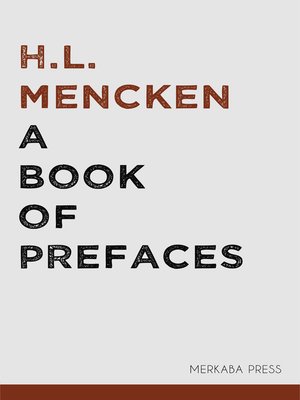
Sign up to save your library
With an OverDrive account, you can save your favorite libraries for at-a-glance information about availability. Find out more about OverDrive accounts.
Find this title in Libby, the library reading app by OverDrive.



Search for a digital library with this title
Title found at these libraries:
| Library Name | Distance |
|---|---|
| Loading... |
This fourth printing of "A Book of Prefaces" offers me temptation, as the third did, to revise the whole book, and particularly the chapters on Conrad, Dreiser and Huneker, all of whom have printed important new books since the text was completed. In addition, Huneker has died. But the changes that I'd make, after all, would be very slight, and so it seems better not to make them at all. From Conrad have come "The Arrow of Gold" and "The Rescue," not to mention a large number of sumptuous reprints of old magazine articles, evidently put between covers for the sole purpose of entertaining collectors. From Dreiser have come "Free," "Twelve Men," "Hey, Rub-a-Dub-Dub" and some chapters of autobiography. From Huneker, before and after his death, have come "Unicorns," "Bedouins," "Steeple-Jack," "Painted Veils" and "Variations." But not one of these books materially modifies the position of its author. "The Arrow of Gold," I suppose, has puzzled a good many of Conrad's admirers, but certainly "The Rescue" has offered ample proof that his old powers are not diminished. The Dreiser books, like their predecessors that I discuss here, reveal the curious unevenness of the author. Parts of "Free" are hollow and irritating, and nearly all of "Hey, Rub-a-Dub-Dub" is feeble, but in "Twelve Men" there are some chapters that rank with the very best of "The Titan" and "Jennie Gerhardt." The place of Dreiser in our literature is frequently challenged, and often violently, but never successfully. As the years pass his solid dignity as an artist becomes more and more evident. Huneker's last five works changed his position very little. "Bedouins," "Unicorns" and "Variations" belong mainly to his journalism, but into "Steeple-Jack," and above all into "Painted Veils" he put his genuine self. I have discussed all of these books in other places, and paid my small tribute to the man himself, a light burning brightly through a dark night, and snuffed out only at the dawn.
-H.L. Mencken







